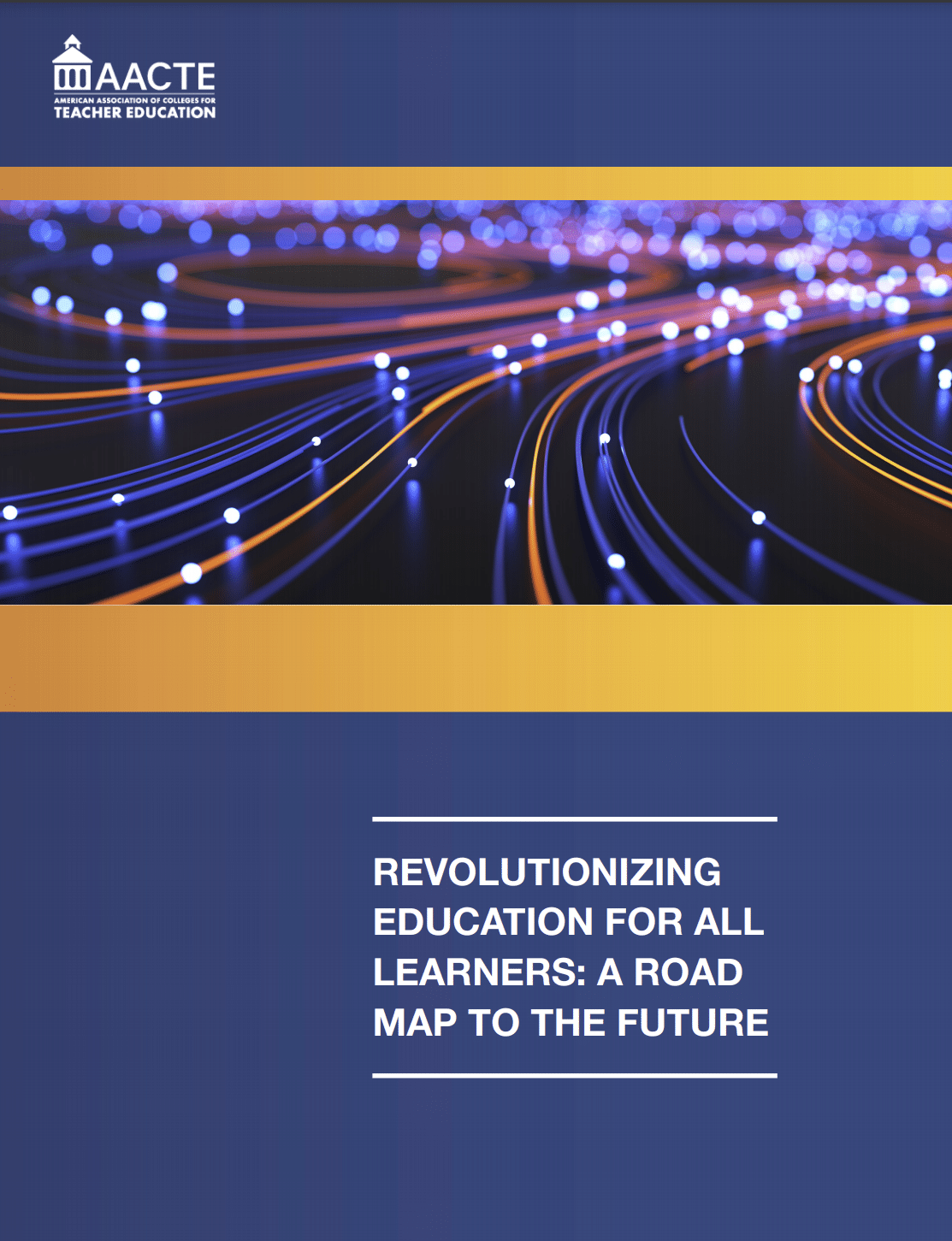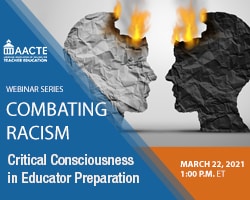18 Mar2021
By Leslie T. Fenwick
 Earlier this year, in my role as AACTE’s dean in residence, I had the privilege of interviewing 13 engaged and knowledgeable thought-leaders at influential grant-making and public policy organizations, as well as a cross-section of deans of education at diverse U.S. institutions. These individuals are leaders at Carnegie Foundation of New York, Spencer Foundation, Kellogg Foundation, Harvard University, Clark Atlanta University (an HBCU), Kansas State University (a land grant institution), Excelencia in Education, the Washington Lawyers Committee on Civil Rights, and the Center for American Progress, among others.
Earlier this year, in my role as AACTE’s dean in residence, I had the privilege of interviewing 13 engaged and knowledgeable thought-leaders at influential grant-making and public policy organizations, as well as a cross-section of deans of education at diverse U.S. institutions. These individuals are leaders at Carnegie Foundation of New York, Spencer Foundation, Kellogg Foundation, Harvard University, Clark Atlanta University (an HBCU), Kansas State University (a land grant institution), Excelencia in Education, the Washington Lawyers Committee on Civil Rights, and the Center for American Progress, among others.
I began the interviews asking these leaders two questions related to AACTE’s new vision which is to collaborate with members and partners to revolutionize education for all learners.
- Is “revolution” the most appropriate term to describe what is needed in our PK-12 education system?
- Is a revolution needed? If so, what do you think it will take to revolutionize education for all PK-12 learners?
16 Mar2021
By Candace Johnson and Michael Douglas

Houston Endowment has awarded Prairie View A&M University’s Whitlowe R. Green College of Education (WRGCOE) one of the college’s largest grants in its 141-year history. The foundation is investing $1.5 million in the College to support PVAMU’s Educator Preparation Program, increasing the number of qualified teachers of color and preparing the educators for long-term success. The grant is part of $20M in funds the Houston Endowment awarded to several Houston area organizations committed to making racial equity and social justice in Houston a reality.
16 Mar2021
By Leslie Ekpe
The coronavirus (COVID-19) pandemic brought immediate changes to the normalcy of pedagogy practiced within the classroom. Because of the changes, educators are tasked with establishing innovative approaches to teaching in making the learning process more engaging. For a variety of factors, technology-enhanced learning (TEL) is critical. It is critical not only because it is the current educational standard but also because it can enhance the way we develop the education system (Carrillo and Flores, 2020). The Applying Technology-Enhanced Teaching Strategies to the New Normal in 2021 and Beyond session at the AACTE 2021 Annual Meeting took a deeper dive into the need for more teacher preparation programs that adopt inclusive approaches to educating at all levels of education.
16 Mar2021
By Jane E. West
 This blog post is written by AACTE consultant Jane West and is intended to provide updated information. The views expressed in this post do not necessarily reflect the views of AACTE.
This blog post is written by AACTE consultant Jane West and is intended to provide updated information. The views expressed in this post do not necessarily reflect the views of AACTE.
President Biden Signs Massive $1.9 trillion American Rescue Plan Act
On Thursday evening, just before a primetime address to the nation, President Biden signed into law the American Rescue Plan Act of 2021 (ARPA).
The House gave its final approval of the bill on Wednesday. Congressional Republicans, who voted en masse against the bill, have criticized the deal for funneling money to schools that haven’t offered in-person instruction despite earlier rounds of pandemic relief.
ARPA includes $122.8 billion for the Elementary and Secondary School Emergency Relief Fund (ESSER). ESSER funds will be distributed to states in the same way that the last two federal rescue packages were distributed: based on their relative Title I, Part A funding. The first $800 million of ESSER funding must be used by states to provide educational and wraparound services to students experiencing homelessness. The bill requires states to distribute the remaining $122 billion in the following manner :
- Local Education Agencies (LEAs) ($109.8 billion): Ninety percent of funding will be distributed to districts based on their relative share of Title I, Part A funding.
- Lost Learning Time ($6.1 billion): States must use at least 5% of their ESSER funding “to address learning loss by supporting the implementation of evidence-based interventions, such as summer learning, extended day, or extended school year programs, and ensure such interventions respond to students’ academic, social, and emotional needs and address the disproportionate impact of the coronavirus on [students of color, students from families experiencing low-incomes, students with disabilities, English language learners, migrant students, students experiencing homelessness, and students in foster care].”
- After-School Programs ($1.2 billion): A minimum of 1% of state funding must be used for after-school programs that address students’ academic, social, and emotional needs.
- Summer Enrichment Programs ($1.2 billion): At least 1% of funding must be used by states to provide students with evidence-based summer learning programs.
- Administration Costs ($610 million): States can spend up to 0.5% of their funding on the costs of administrating this program.
- Remaining State Funds ($3 billion): States will be allowed to use these funds on any of the allowable uses in the act.
LEAs will be required to use at least 20% of the funds they receive ($22 billion) to address lost learning time for students. They will have the freedom to spend the remaining 80% ($87.8 billion) of funding based on local needs and priorities. Senate Democrats are circulating a Congressional Research Service memo with estimates of Education Stabilization Fund totals for states and institutions of higher education (IHE). It breaks out funding by state for the K-12 fund, the non-public schools, and the higher education fund (by state and by type of IHE). The last pages aggregate each state’s total from all three emergency relief funds.
In the final bill, a number of amendments approved by the Senate were included that increased funding for students with disabilities, students experiencing homelessness, and sought transparency in school district’s plans for reopening and addressing continuity of services.
- As amended, the legislation provides $2.6 billion in additional funding for state special education grants under the Individuals with Disabilities Education Act (IDEA) for this fiscal year, which ends Sept. 30. In addition, the legislation provides $200 million for special education preschool grants, and $250 million for infants and toddlers with disabilities, both under the IDEA.
- The Senate took $2.75 billion out of the House bill’s K-12 relief fund and earmarked it for private schools. Governors would allocate this money.
- Maggie Hassan (D-N.H) offered an amendment that will ensure schools are transparent in their plans surrounding reopening and learning opportunities. The amendment says that within 30 days of receiving this new relief funding, school districts will have to publish “a plan for the safe return to in-person instruction and continuity of services.”
- Lisa Murkowski, (R-AK) introduced an amendment that was agreed to by the Senate that provides $800 million help identify students experiencing homelessness, and to provide those students with wraparound services.
Other elements of the bill that are worth noting include:
- States and schools must reserve roughly 25 percent of the stabilization fund for learning recovery (e.g. summer school and extended-day programs).
- $350 billion is available for state and local governments.
- $7 billion is available to help students and educators connect to the internet and provide them with connected devices, through the federal E-Rate program.
- $39 billion will go to early-childhood programs, including Child Care and Development Block Grants and a stabilization fund for child-care providers.
- Language in ARPA would punish states that want to enact/expand a new voucher tax credit by requiring them to pay back the equivalent amount of federal aid dollars as the tax credit they are issuing.
- Families can claim up to $3,600 per child under age 6 and $3,000 for children up to age 17 for one year to help combat the economic damage of the pandemic. House Democrats are looking to make the tax change The current tax credit is up to $2,000 per child.
The bill also includes about $40 billion for higher education—about half of which will go to emergency funding in grants to students. ACE President Ted Mitchell said that while the amount of higher ed funding “falls short of our most recent estimate of at least $97 billion in student and institutional needs, it still represents the largest federal effort so far to assist students and families struggling to cope with lost jobs or reduced wages and colleges and universities facing precipitous declines in revenues and soaring new expenses.” Additional funds will go to support Historically Black Colleges and Universities, Tribal Colleges and Universities, Hispanic-Serving Institutions, and other Minority-Serving Institutions. A provision is included in the bill that would exempt all student loan forgiveness from federal taxes for five years, perhaps paving the way for expanded student debt cancellation.
As I close, I offer a big shout out to one of our own—Kim Knackstedt—who has been named as the first White House Director of Disability Policy. With her Ph.D. in special education and several years of experience working on Capitol Hill, Kim is imminently qualified for this position. I know you join me in congratulating her!
And a big thank you to Kaitlyn Brennan for her research and writing for this Washington Update.
Read the full Washington Update on my website for more information.
15 Mar2021
By Nicole Dunn
 AACTE is honored to welcome three panelists from member institution Rowan University to lead its next webinar in the Combating Racism in Educator Preparation Series. For this installment, Monika Shealey, Shelley Zion, and Beatrice Carey, who are among those leading the creation and implementation of Rowan’s DEI certificate program, will teach participants to tune into their critical consciousness to sustain a lifelong commitment to addressing structural oppression.
AACTE is honored to welcome three panelists from member institution Rowan University to lead its next webinar in the Combating Racism in Educator Preparation Series. For this installment, Monika Shealey, Shelley Zion, and Beatrice Carey, who are among those leading the creation and implementation of Rowan’s DEI certificate program, will teach participants to tune into their critical consciousness to sustain a lifelong commitment to addressing structural oppression.
The Critical Consciousness in Educator Preparation webinar will take place on Monday, March 22, 1:00-2:15pm EST. In this interactive webinar, attendees will learn and practice several foundational strategies based on the certificate program modules. Whatever your role and wherever you are on the lifelong path of being a genuinely antiracist, abolitionist, and intersectional educator, you will benefit from this webinar as either a starting or reflective framework for the individual educator to live and promulgate these values through the field.
15 Mar2021
By Karen DeMoss and Gretchen Mills
 Every institution knows that affordability is an important factor in attracting candidates into teacher preparation programs. During the 2019-20 school year, Prepared To Teach at Bank Street College conducted a survey of more than 1,200 aspiring teachers at 12 institutions across seven states to understand their financial situations. Our first report on the survey findings, #MoreLearningLessDebt: Voices of Aspiring Teachers on Why Money Matters, unpacks the financial anxiety felt by so many aspiring teachers and makes recommendations to alleviate that anxiety through research, practice, and policy.
Every institution knows that affordability is an important factor in attracting candidates into teacher preparation programs. During the 2019-20 school year, Prepared To Teach at Bank Street College conducted a survey of more than 1,200 aspiring teachers at 12 institutions across seven states to understand their financial situations. Our first report on the survey findings, #MoreLearningLessDebt: Voices of Aspiring Teachers on Why Money Matters, unpacks the financial anxiety felt by so many aspiring teachers and makes recommendations to alleviate that anxiety through research, practice, and policy.
15 Mar2021
By Danna Demezier
AACTE presented a Deeper Dive session on February 24, 2021 at its 73rd Annual Meeting, “Leading in the Time of Crisis: Responding to COVID-19 and Social Justice Movements.” This panel discussion, moderated by AACTE’s Vice President of Research, Policy, & Advocacy Jacqueline Rodriguez, explored the leadership responses of three education deans to the national and racial pandemic. Although the issues raised were not easy to navigate, each dean highlighted specific strategies and intentional efforts made at their respective institution, which demonstrated the keen ability to lead with justice, compassion, and action. In listening to their responses, I noted that each response matched one of John C. Maxwell’s quote for leadership success, “Everything rises and falls on leadership.”
Jacqueline Rodriguez described the deans as equity-minded leaders who start off with empathy and maintain their efforts through action.
15 Mar2021
By Gaelle Gilbert

The Opening Keynote session at the virtual AACTE 73rd Annual Meeting included five speakers, each addressing the theme, “Policy and Practice for a Post-Pandemic World.” The keynote presenters were Jack Reed, Alma Adams, Karen Marrongelle, Leslie Fenwick and Elizabeth Warren.
AACTE President and CEO Lynn M. Gangone and Edthena CEO Adam Gheller opened the Keynote session with insight about AACTE resources. Gangone talked in depth about the COVID-19 resource hub that AACTE made available through its website, and the state policy tracker map. A tool that helps teachers identify certification and policies in their respective states. Gheller stressed the importance of video observation in today’s educational climate, and how Edthena is helping 20 AACTE Member institutions with a grant to implement its use.
12 Mar2021
By Rebecca West Burns
The American Educational Research Association (AERA) Professional Development School Research Special Interest Group (SIG) in partnership with Georgia State University (GSU) has received a Research Conference Grant Award from AERA. The purpose of the grant award is to support a three-day conference in September of 2021 on advancing PDS research and creating a collaborative national research agenda. Researchers, scholars, scholar-practitioners and doctoral students from different regions of the country, representing diverse perspectives, and varied domains of inquiry will be invited to present their visions, views, theories, research and research approaches. The conference will be in-person at GSU and remote for a number of individuals starting on Friday, September 17 through Sunday, September 19.
12 Mar2021
By John McDonald

This article originally appeared in Ampersand, the UCLA Ed & IS online magazine, and is reprinted with permission.
The Center for the Transformation of Schools at the UCLA School of Education and Information Studies is launching a new research initiative to inform and strengthen efforts to increase the racial, cultural and linguistic diversity of educators in California.
The project will bring together expert researchers and K-12 and higher education representatives from a variety of backgrounds to examine and identify the factors that fuel the gap in the racial identity of California’s educators and the students they serve. The research will produce an evidence-based landscape study of the challenge, as well as additional research and policy briefs that build public awareness and set forth strategies and models for state and local efforts to increase the diversity of the education workforce. The project is funded by a grant from the William & Flora Hewlett Foundation and from the Bill & Melinda Gates Foundation as part of a national effort to increase educator diversity.
10 Mar2021
By Michael Rose
AACTE today expressed its appreciation to Congress for passing the American Rescue Plan Act. The legislation was passed to help the nation recover from the impact of the COVID-19 pandemic on our nation and the world. The Act includes funding to support schools and colleges in creating safe learning environments to enable P-12 students and teachers to successfully return to face-to-face instruction as soon as possible. President Biden is expected to sign the Act into law.
While there are calls to immediately open schools and colleges, teachers and others are hesitant to return unless their safety can be assured. AACTE believes this legislation is critical to helping the nation’s schools to do just that—reopen safely.
10 Mar2021
By Matthew Wales
 Now through May 28, AACTE is accepting session proposals for the 74th Annual Meeting, to be held in New Orleans, LA, March 4-6, 2022. We also invite applications by May 14 from AACTE member faculty to review proposals.
Now through May 28, AACTE is accepting session proposals for the 74th Annual Meeting, to be held in New Orleans, LA, March 4-6, 2022. We also invite applications by May 14 from AACTE member faculty to review proposals.
The conference theme is “Rethink, Reshape, Reimagine, Revolutionize: Growing the Profession Post Pandemic,” conceptualized as follows in the call for proposals:
The events of 2020 challenged the field of education in dramatic and unprecedented ways. The advent of the pandemic thrust educators into uncharted territory and created a dramatically different, virtual context for teaching and learning. As the COVID‐19 crisis unfolded, teachers and teacher candidates quickly adapted their instruction to incorporate multiple modes of delivery, including virtual, hybrid, and in‐person instruction constrained by masks, plexiglass, and social distancing. The enormous investment of energy required to make the sudden shift, the isolation imposed by the threat of the pandemic, and the separation from colleagues tested the intellect, energy, and emotional resilience of educators. In the midst of this unforeseen and uncharted environment, a pressing challenge arose: addressing the striking inequities of access to technology and learning, clearly delineated along socioeconomic lines, which stood to further expand the achievement gap between white students and their classmates of color.
09 Mar2021
By E. Wyatt Gordon

Learner-centered design (LCD) has become a key component of digital products and platforms; curriculum and lesson planning; and non-didactic pedagogical approaches. This paradigm foregrounds the needs of learners by meeting learners where they are. LCD proposes that all designed environments should be built around the goals, needs, activities and educational contexts of users. In essence, LCDs allow for the incorporation of the whole learner by using their preferences, strengths, weaknesses, and interests as assets that can be leveraged to strengthen learning experiences.
08 Mar2021
By Jane E. West
This blog post is written by AACTE consultant Jane West and is intended to provide updated information. The views expressed in this post do not necessarily reflect the views of AACTE.
Biden Administration Forges Ahead on School Reopening/Vaccines for Teachers as Secretary of Education Cardona Takes Office
 On Tuesday evening Miguel Cardona was sworn in as the nation’s new Secretary of Education. The Senate voted 64-33 to confirm Cardona, a former public school teacher, principal and state superintendent. Cardona assumes the Education Department’s top job as the debate around how to safely reopen schools has grown increasingly bitter. President Biden in response is now walking a political tightrope, reassuring teachers they should be prioritized for the vaccine while recent guidance from the Centers for Disease Control and Prevention notes that vaccinations should not be a prerequisite for reopening schools. Anthony Fauci, the head of the National Institute of Allergy and Infectious Diseases, said last month that vaccinating all teachers against COVID-19 before reopening schools is “non-workable,” Cardona wasted no time, diving into the debate over school reopening—with a USA Today op-ed posting as his swearing-in ceremony concluded. In the article, Cardona reaffirmed his commitment to safely reopening schools, announcing that he will convene a “national summit on safe school reopening” later this month.
On Tuesday evening Miguel Cardona was sworn in as the nation’s new Secretary of Education. The Senate voted 64-33 to confirm Cardona, a former public school teacher, principal and state superintendent. Cardona assumes the Education Department’s top job as the debate around how to safely reopen schools has grown increasingly bitter. President Biden in response is now walking a political tightrope, reassuring teachers they should be prioritized for the vaccine while recent guidance from the Centers for Disease Control and Prevention notes that vaccinations should not be a prerequisite for reopening schools. Anthony Fauci, the head of the National Institute of Allergy and Infectious Diseases, said last month that vaccinating all teachers against COVID-19 before reopening schools is “non-workable,” Cardona wasted no time, diving into the debate over school reopening—with a USA Today op-ed posting as his swearing-in ceremony concluded. In the article, Cardona reaffirmed his commitment to safely reopening schools, announcing that he will convene a “national summit on safe school reopening” later this month.
08 Mar2021
By Weade James

AACTE is pleased to introduce the 2021-22 Holmes Council, an elected body comprised of current Holmes Program doctoral and master’s students. The Council serves as a student voice to AACTE on the programmatic needs of the Holmes Program. All newly elected officers will serve a one-year term, with exception of the president and vice president who will each serve for two consecutive years.
 Earlier this year, in my role as AACTE’s dean in residence, I had the privilege of interviewing 13 engaged and knowledgeable thought-leaders at influential grant-making and public policy organizations, as well as a cross-section of deans of education at diverse U.S. institutions. These individuals are leaders at Carnegie Foundation of New York, Spencer Foundation, Kellogg Foundation, Harvard University, Clark Atlanta University (an HBCU), Kansas State University (a land grant institution), Excelencia in Education, the Washington Lawyers Committee on Civil Rights, and the Center for American Progress, among others.
Earlier this year, in my role as AACTE’s dean in residence, I had the privilege of interviewing 13 engaged and knowledgeable thought-leaders at influential grant-making and public policy organizations, as well as a cross-section of deans of education at diverse U.S. institutions. These individuals are leaders at Carnegie Foundation of New York, Spencer Foundation, Kellogg Foundation, Harvard University, Clark Atlanta University (an HBCU), Kansas State University (a land grant institution), Excelencia in Education, the Washington Lawyers Committee on Civil Rights, and the Center for American Progress, among others. 


 This blog post is written by AACTE consultant Jane West and is intended to provide updated information. The views expressed in this post do not necessarily reflect the views of AACTE.
This blog post is written by AACTE consultant Jane West and is intended to provide updated information. The views expressed in this post do not necessarily reflect the views of AACTE.  AACTE is honored to welcome three panelists from member institution Rowan University to lead its next webinar in the Combating Racism in Educator Preparation Series. For this installment, Monika Shealey, Shelley Zion, and Beatrice Carey, who are among those leading the creation and implementation of Rowan’s DEI certificate program, will teach participants to tune into their critical consciousness to sustain a lifelong commitment to addressing structural oppression.
AACTE is honored to welcome three panelists from member institution Rowan University to lead its next webinar in the Combating Racism in Educator Preparation Series. For this installment, Monika Shealey, Shelley Zion, and Beatrice Carey, who are among those leading the creation and implementation of Rowan’s DEI certificate program, will teach participants to tune into their critical consciousness to sustain a lifelong commitment to addressing structural oppression.  Every institution knows that affordability is an important factor in attracting candidates into teacher preparation programs. During the 2019-20 school year, Prepared To Teach at Bank Street College conducted a survey of more than 1,200 aspiring teachers at 12 institutions across seven states to understand their financial situations. Our first report on the survey findings,
Every institution knows that affordability is an important factor in attracting candidates into teacher preparation programs. During the 2019-20 school year, Prepared To Teach at Bank Street College conducted a survey of more than 1,200 aspiring teachers at 12 institutions across seven states to understand their financial situations. Our first report on the survey findings, 

 Now through May 28, AACTE is accepting session proposals for the 74th Annual Meeting, to be held in New Orleans, LA, March 4-6, 2022. We also invite applications by May 14 from AACTE member faculty to review proposals.
Now through May 28, AACTE is accepting session proposals for the 74th Annual Meeting, to be held in New Orleans, LA, March 4-6, 2022. We also invite applications by May 14 from AACTE member faculty to review proposals.
 On Tuesday evening Miguel Cardona was sworn in as the nation’s new Secretary of Education. The Senate voted 64-33 to confirm
On Tuesday evening Miguel Cardona was sworn in as the nation’s new Secretary of Education. The Senate voted 64-33 to confirm 